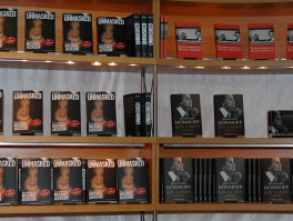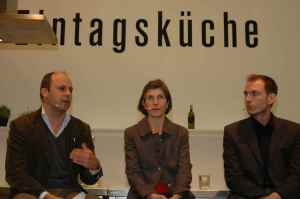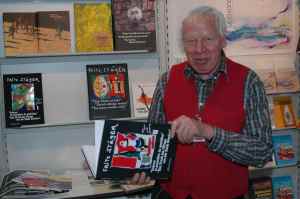Chinese checkers
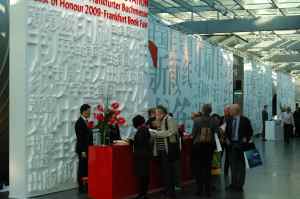
Digital content creation is not the only elephant being talked about at the Frankfurt Book Fair. The other was guest of honor China. But the conversation is lopsided. China has its own room near the entrance with a delightfully meditative installation, a pond nestled in white sand with the big logo of ideograms carved into wooden blocks. One company has a line of small laptops all showing pages with gaudy pictures and Chinese texts. A young woman, extremely young for my tired old eyes, comes up to me without bidding. We speak a mixture of German and English. It seems to me they are looking for content. They buy copyrights. “Thrillers?” I ask. Yes, yes, people like thrillers in China. And it is a huge market, I muse. Yes, she says, a big market. Something to note, a huge and eager market…. Maybe finishing that thriller I started 5 years ago might be a good idea. Maybe there are better things to do…

Metamorphosis
Is this the same China that pumped out all those manifestoes on poor paper just a few decades ago? The country where everyone wore blue jackets and rode bicycles? The nation of great leaps forward and cultural revolutions with millions of deaths? Tiananmen Square? I cannot recall regime change, but everyone can go there, one airline is offering special discounts: € 499. And the business sector is in awe, even freedom-loving Jack Welch. Arte is blasting a program on Chinese writers, a young authoress talks about the country being a China Town, no longer in touch with its tradition. The ubiquitous books revering its economic energy are beginning to feel like a waste of trees. A week earlier, Nelson Schwartz and Matthew Saltmarsh from the New York Times were decrying some mysterious illness called “Eurosclerosis,” Europe’s somewhat plodding economy, and noting one should speak of a G-2, the United States and China. “Ideally, it would be the G-3, but Europe doesn’t speak with a single voice and they can’t coordinate and function the same way the U.S. and China can,” the authors quote C. Fred Bergsten, director of the Peterson Institute for International Economics. But these two distinguished, oft-published journalists apparently have not noticed the human costs of the boom. It seems unimportant in Mammon’s great maw.
Human matters
For a dissenting view, you have to march all the way to the cubbyhole booths in Hall 3.0 and 3.1, for example. 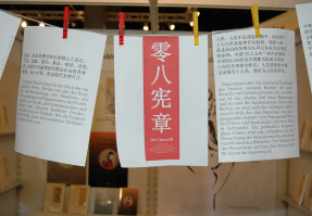 Regina Berlinghof, IT specialist by day, authoress and publisher of ancient spiritual and lyrical texts for YinYang Media by night, has hung texts of the Charter 08, a free speech manifesto for the people and artists of China. “Human rights are not given by the state,” one page states boldly, “rather, they are rights that each individual possesses at birth.” At birth is an interesting concept. And possession, too. Possessions are eminently fragile. They can be bought, taken, or even embezzled away. “A Chinese couple came by and nodded approvingly,” she points out. “You are the only one who actually stopped to find out more. Other journalists came by, but they didn’t take notice,” she points out sadly. We eat a few macadamia nuts and talk of the great Chinese thinkers, the artists, they are always the true value of a nation. And behind its army of bureaucrats, China has a grand culture that stretches back to the days of Gog and Magog. Alas, it has no clout.
Regina Berlinghof, IT specialist by day, authoress and publisher of ancient spiritual and lyrical texts for YinYang Media by night, has hung texts of the Charter 08, a free speech manifesto for the people and artists of China. “Human rights are not given by the state,” one page states boldly, “rather, they are rights that each individual possesses at birth.” At birth is an interesting concept. And possession, too. Possessions are eminently fragile. They can be bought, taken, or even embezzled away. “A Chinese couple came by and nodded approvingly,” she points out. “You are the only one who actually stopped to find out more. Other journalists came by, but they didn’t take notice,” she points out sadly. We eat a few macadamia nuts and talk of the great Chinese thinkers, the artists, they are always the true value of a nation. And behind its army of bureaucrats, China has a grand culture that stretches back to the days of Gog and Magog. Alas, it has no clout.
One storey higher, I find Amnesty International with a big yellow poster announcing a round table about dissident writer Liao Yiwu (his “Public-Toilet Manager” will brighten your day, no doubt), who was not allowed to travel. The event is also being organized by the S. Fischer publishing house, a big one in Germany, but the print is small. Fischer brought out a complete collection of books on the Nazi concentration camps a while ago, so they know what they are talking about.
Not far is a tiny stand with a single book on display called Laogai, from agenda Verlag & Gallerie. It has a picture of men in police uniform pointing guns. Laogai, which derives from the word for reeducation camps. A concentration camp. (Laogai…. Sounds spookily similar to Lager, and shares three letters with Gulag). I open it, a sentence springs up at me: 68 non-violent crimes are punishable by death in China, one of them tax evasion. I turn a page, gruesome pictures of executions, in the background are white vans, presumably – says the caption – mobile labs to harvest the fresh organs. Dr. Bernhard Schneeberger has a good sense of humor, but here his demeanor is filled with anger: That is what you get when you combine hard-nosed capitalism with hard-line communism, he says.
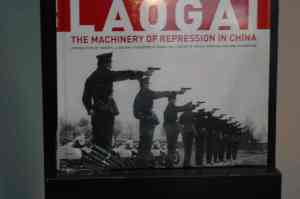 Six Sigma meets the Gulag, essentially. China’s motto at the fair is “Tradition and Innovation,” (two buzz-terms used ad nauseam by anyone from distinguished watch makers to tourist offices around the world). Traditional law meets innovative means to mete it out and profit. The law of supply and demand applied to human beings, who are in large supply in China, and always have been; the supply always a little larger than demand, so it is cheap. Organ harvesting at the killing field, a case for just-in-time delivery. A literal understanding of the term human resources. The result: fantastic growth. Great idea for Europe’s sclerotic economy, Mr. Schwartz, no? It was tried here, didn’t work out that well, but maybe now it could be tried again. After all, who really cares as long as the toys are cheap.
Six Sigma meets the Gulag, essentially. China’s motto at the fair is “Tradition and Innovation,” (two buzz-terms used ad nauseam by anyone from distinguished watch makers to tourist offices around the world). Traditional law meets innovative means to mete it out and profit. The law of supply and demand applied to human beings, who are in large supply in China, and always have been; the supply always a little larger than demand, so it is cheap. Organ harvesting at the killing field, a case for just-in-time delivery. A literal understanding of the term human resources. The result: fantastic growth. Great idea for Europe’s sclerotic economy, Mr. Schwartz, no? It was tried here, didn’t work out that well, but maybe now it could be tried again. After all, who really cares as long as the toys are cheap.
Schneeberger pulls out another book, this one on cheap paper, with a paper cover featuring a youngish man with an ernest look on his face. He is lawyer Gao Zhisheng and is book is called A China More Just. This high-powered figure started defending human rights groups, but disappeared off the face of the earth. I cannot help but recall the story of Raoul Wallenberg. The Chinese did not publish his book, of course, they outsourced the job to South Korea, which had it printed … in China. There will always be a Kafka.
Down the aisle I see a woman in a cage. She hands me bookmarks featuring authors such as Tsering Woeser, whose Notes on Tibet was prohibited for “serious political errors.” Another bookmark announces a round table with Chinese authoress Xu Pei, the Uigur writer Sidik Haji Rouzi, and the Tibetan journalist Tsewang Norbu. And the man at www. savetibet.de hands me brochures, two bumper stickers and a cloth bag bearing the Tibetan flag. He suggests I pass by the Chinese hall on the way out. That will make no difference at all, since the powers-that-be are in fact absent. They are laughing all the way to the nearest bank.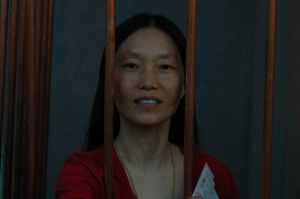
Yes, some trouble did erupt at a pre-Fair symposium. The official Chinese, worthy heirs to Chairman Mao, were very upset at hearing public displays of real criticism, and Jürgen Boos, head of the Fair, actually apologized. And so, on the first evening, the Wednesday, Angela Merkel visited the Book Fair. She was accompanied by Xi Jinping, China’s Vice President. They did not wander through Hall 3.1. They did not hear of the demo against China in the streets. They avoided the Amnesty International/Fischer round table. Don’t want to rock any boats. Angela Merkel, like most political figures, is just a kind of PR manager at this point. What are a few silenced authors versus billions in high-speed trains and other technology; what are the hundreds of thousands of poorly paid, at times imprisoned workers against cheap shoes, shirts, bicycles and other wares. I cannot help think of Sarah Palin’s recent visit to Hong Kong to talk to Chinese businessmen. She took time to criticize the Obama administration, she calls him a Socialist, she hallucinates about death panels, and that in the land of laogai.
A cartoon from the 80s comes to mind: Reagan with a quizzical expression on his face holding a document marked “China briefing.” George Shultz then Secretary of State is captioned saying: “Yes, 1 billion Communists, I thought you knew!” Apparently we conveniently forgot and still forget while staring down official bogeymen, smaller ones without quite the clout of the Chinese Communist Party and its gigantic economy. Keep smiling, don’t be so negative, move on. That is the rhetorical soma of the age, the prozac slogans.
That gets student Ludvìk Jahn into some serious trouble. It’s something to think about.


